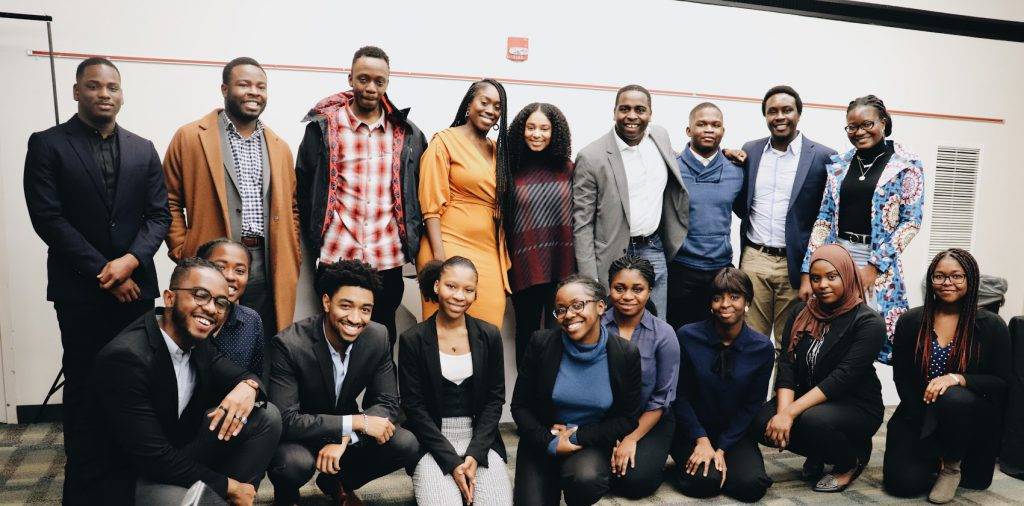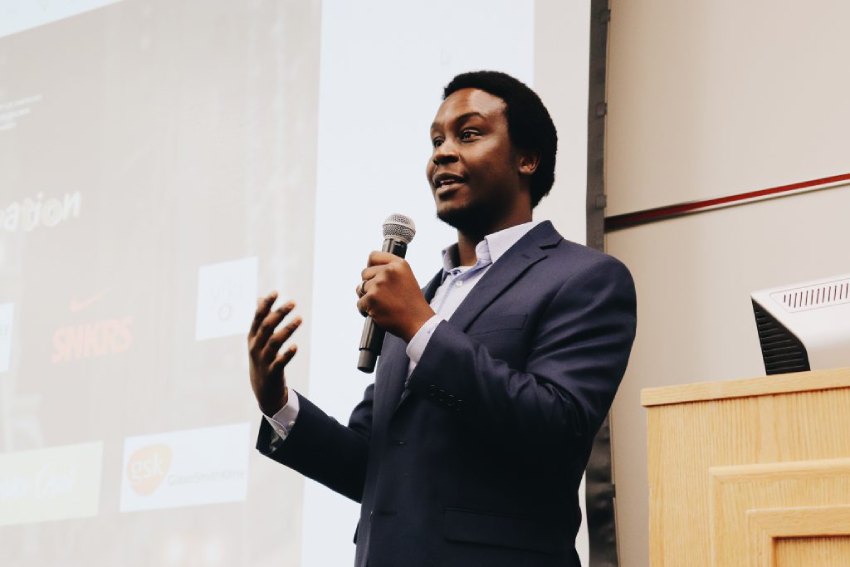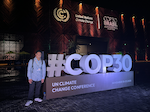

Munya Choga ’12 with the planning committee and panelists at the Society of Emerging African Leaders (SEAL) Annual Leadership Conference in 2019 at Temple University.
International students at Gettysburg face unprecedented circumstances when studying in a foreign country. While they apply themselves to their studies, build relationships, and pursue professional endeavors, they are also navigating a new culture and acclimating to a new environment.
Munya Choga ’12 experienced this new set of circumstances firsthand when he traveled from his home of Zimbabwe, his home country, to attend Gettysburg College. He pursued internships, trips, and professional opportunities that set him up for a career journey which led him from developing software at Goldman Sachs after graduation to working in operations, consulting, and management at AppNexus.
“Everyone has passions and dreams—I’ve always been a dreamer,” said Choga, remembering his childhood desire to move to the United States with a full scholarship and work as an investment banker. “But then as we get new information and as you meet new people along the way, mentors and advisors speak life into ideas.”
Though Choga originally dreamed of working on Wall Street, he opened his mind to other career options within software engineering and economic development, thanks to mentors like Economics Prof. Eileen Stillwaggon. He graduated cum laude from Gettysburg with a double major in economics and computer science.
“If I was purely hung up on the idea that I wanted to be an investment banker, maybe I wouldn’t have been able to do some of the things that I’m actually doing now,” said Choga, who is now a technical solutions consultant at a large tech company. “Talking to people is not a bad idea, [nor is] allowing other people to speak life into your dreams, or your passions or interests.”
Paying it forward
After learning the importance of advising at Gettysburg, Choga and his wife, Mitchelle, co-founded CareerPalz, a startup that focuses on career mentorship for international students, in March of 2019.
Named for its emphasis on building a community to rise against challenges, CareerPalz provides actionable support to help students not only succeed academically and professionally in the U.S., but also overcome unique challenges that come with studying in a foreign country. The 501(c)(3) nonprofit also received a donation from the funds raised during Burgburst, Gettysburg’s annual cultural event, in 2019.
 Munya Choga ’12 delivering the keynote speech at the Society of Emerging African Leaders (SEAL) Annual Leadership Conference in 2019.
Munya Choga ’12 delivering the keynote speech at the Society of Emerging African Leaders (SEAL) Annual Leadership Conference in 2019.
“A lot of international students face the challenge of understanding how to navigate the complicated immigration landscape in this country that’s always changing every day,” Choga said. “So, part of it is understanding how to survive immigration challenges, but then also make sure that you're investing enough time in your college experience to learn and connect and have lasting relationships inside and outside of class.”
Choga hopes that CareerPalz will continue to be a strong network of mentees turned mentors that pay forward what they’ve learned within the community. The nonprofit fundamentally serves as a channel to overcome challenges and give back.
“At the end of the day, success is not an independent game,” Choga said of the organization’s success- and community-oriented mission. “As people are looking to launch their careers, it’s important to plan, because if you don’t plan, you’re just going to panic. We’re trying to remove the pain from that process and essentially be there for each other.”
Problem-solving and preparedness
Throughout his life, Choga has been driven by planning and solving problems. While living in Zimbabwe, he bore witness to the impact that the work of nonprofit organizations has had on the country, including the organization his brother works for, World Vision. He brought his passion for helping others and improving the economy to Gettysburg.
“At Gettysburg, I was looking to understand how I could leverage the resources in the U.S. to be able to better understand developing countries and what problems we needed to solve from an economic standpoint,” he said. “My majors helped combine my interest in economic development, and how I can solve problems using my technology skills to improve the economy, or to improve people around me.”
Not only does Choga chalk up his success to the dynamic mentorship within the Gettysburg community, he also considers his personal emphasis on planning to be particularly beneficial toward achieving his goals. As soon as Choga arrived at Gettysburg in 2008, he declared a major in economics and planned out all four years of classes with his advisor.
Choga then immediately began to take advantage of the unique opportunities for academic and professional growth at Gettysburg. He was an Eisenhower Institute Fellow, ventured to Burkina Faso to build a library with the Davis Projects for Peace grant, and worked at the College Union Building desk and as a community advisor for Residence Life. Choga also began interning off-campus during sophomore year and landed an internship at Goldman Sachs in 2011.
“I needed to use my time in college to make sure that I was best prepared for what was to come after,” Choga reflected. “Internships are the easiest way for you to get a job, so after the internship [at Goldman Sachs], that’s how I got my full-time offer.”
Success Factors
According to Choga, the two keys to professional success are mentorship and skill development. He used his liberal arts thinking to set himself apart in the job search and has not only focused on the technical side of software engineering, but also the user-facing realm by speaking directly to people who use the systems he builds.
“As you’re looking to establish [yourself], it’s important to understand what you’re good at, and then do more of that as opposed to trying to be good at everything,” Choga said. “In this day and age, it’s not enough to just get a grade. You kind of have to go above and beyond and show that you’re passionate about something because employers are looking for people who can solve problems.”
Choga champions a liberal arts and sciences education as a catalyst for success.
“You’re going to be asked to do things that you don’t know,” he said. “As opposed to saying, ‘I don’t know this,’ [you ask], ‘What do I need to do to find out how to do it right?’ And that’s what a liberal arts education teaches you.”
Learn more about opportunities for international students at Gettysburg College.
By Phoebe Doscher ’22
Photos courtesy of Munya Choga ’12
Posted: 08/04/20


